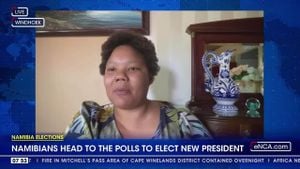California Governor Gavin Newsom is gearing up for what could be another clash with the incoming Trump administration, focusing on electric vehicle (EV) policies amid potential changes to federal tax credits. Announcing his intention to revive the state's Clean Vehicle Rebate Program, Newsom is determined to keep electric vehicle adoption moving forward, especially if President-elect Donald Trump follows through on his plan to eliminate the federal EV tax credit.
Since its inception, California's EV rebate program has played a significant role, having funded over 594,000 vehicles and saving approximately 456 million gallons of fuel. Initially launched as a $5,000 rebate, this program eventually expanded to $7,500, significantly boosting the state's zero-emission vehicle initiatives.
Newsom stated, "We will intervene if the Trump administration eliminates the federal tax credit, doubling down on our commitment to clean air and green jobs in California." He emphasized California's resolve not to take steps backward when it came to clean transportation alternatives.
Despite the program's previous successes, it has faced criticisms over its effectiveness and cost. Many have pointed out the high expenditure and its limited impact on reducing greenhouse gas emissions from transportation, which remains California's largest sector for emissions. With accusations of benefiting wealthier individuals who could afford electric vehicles without assistance, the governor's proposal aims to address these issues with greater focus on equity and effectiveness.
Funding for this renewed effort will likely come from the state's Greenhouse Gas Reduction Fund, generated through the state's cap-and-trade program, which imposes costs on industrial polluters for their emissions. This feeds directly back to initiatives intended to combat climate change.
Meanwhile, as Newsom prepares to reinstate this rebate, he faces the reality of California's shaky budget forecasts. Reports indicate the state could experience budget deficits of $2 billion in the coming year, which may hinder efforts to expand or bolster programs like the EV rebates. Legislative leaders have noted the need to exercise caution, considering the budget's future prospects could necessitate more prudent fiscal strategies.
On the federal side, Trump's transition team has signaled intentions to dismantle the $7,500 federal tax credit for electric vehicles as part of broader tax reform efforts. While the exact mechanisms for this change remain unclear, it has stirred significant concern among California lawmakers and climate advocates who fear such moves would stall the state's ambitious goals for reducing emissions and transitioning to sustainably powered transportation.
Elon Musk, CEO of Tesla, has been influential over the past years and even supported Trump's initiatives, leading some analysts to suggest he may benefit from the elimination of the federal tax credit. The argument follows Musk’s claim, "Take away the subsidies, it will only help Tesla," which indicates his belief in the brand's resilience and market strength without reliance on credits.
With Trump's plans potentially leaving many EV buyers without federal support, Newsom's strategy might soon face inevitable challenges. The reinstatement of California's rebate program would be subject to approval by the Legislature, and any delays could lead to substantial barriers for consumers who are awaiting financial incentives for their vehicle purchases.
Overall, California's stance reflects its broader commitment to environmental policies, counterbalancing federal actions seen as regressive. Newsom's leadership could shape how the state navigates these federal pressures moving forward, emphasizing the need for policies aimed not just at quick adoption of electric vehicles, but also at ensuring equitable access and substantial emissions reductions.
Looking to the future, as debates continue over EV policies at the federal level, California stands firm, championing clean air and job creation linked to green technologies. Newsom's call for special sessions to 'Trump-proof' state laws suggests California's stance will not waver even against strong federal headwinds.



